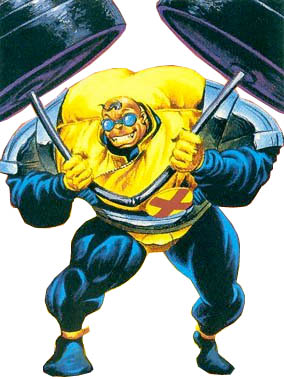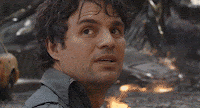Pop culture reference, long overdue. Hopefully you get it. If not… you’re missing out.
If you’ve followed this collection of ramblings for a while, you know that I worked in the film industry
for a number of years before I stepped away to start writing about it. In that time I worked on a lot of television, but also did some low budget movies. And as time went on, something became very clear to me, and once I realized this it changed my attitude a lot. And I came to realize you could always spot inexperienced (or plain ignorant) people on set by this lack of clarity.
Y’see, every member of the crew—for at least for one moment every day—is the most important person on set. Not just the actors and the director and the assistant directors—everyone. The makeup artists, the dolly grip, the on-set dresser, the clapper-loader, the assistant prop master, and even the production assistants. At some point during a given day, they will be the most important person on set for one reason or another.
What’s the proof of this, you ask?
Well, the film industry is focused on money. For all the stories you hear about Hollywood wasting money on things, the truth is most producers squeeze every penny they can out of a film shoot. If someone doesn’t need to be on set—and drawing a paycheck—they just wouldn’t be there. Their job would’ve been eliminated or rolled into someone else’s. Or sometimes just handed off to a production assistant, or even an intern. It’s a regular thing on film sets to have temporary crew members who work a day or two, then vanish until they’re needed again.
If they don’t need to be there… they’re not there.
Now, I gave you that little insight so I could tell you this story.
Back in the early ‘90s the X-Men were taking off and mutant characters were the flavor of the decade at Marvel. Every new character was a mutant. Any old character who’d never had a specific origin became a mutant. Needless to say, most of these new creations were tissue-thin with nothing interesting about them except
their random power or ability.

One of those characters was a guy named Guido. He was a very over-muscled, bespectacled guy with super-strength who’d originally been created as a bodyguard (mutant, of course) for another character (mutant, of course). Guido ended up on the new, government-sponsored X-Force team (in the same-titled comic written by Peter David) and he was there when the team was introduced at a press conference.
Problem was, Guido never picked a code-name. Their NSA liaison couldn’t exactly introduce Havok, Polaris, Quicksilver, Wolfsbane, Multiple Man, and… Guido. Confusion ensued for a moment, during which Guido wandered out on stage in his uniform, seven feet tall and about eight feet wide. And one of the reporters at the press conference said..
“Wow! He must be the strong guy. Every group’s got a strong guy, it must be him.”
To which Guido grinned and proudly announced, “Yes, that’s me. I’m Strong Guy!”
Much giggling ensued. For about two years.
Anyway, there’s a keen little observation there, and it’s why I used this comic book as my example. Almost every superhero team doeshave a strong guy because, at some point or another, every team needs a strong guy. X-Force needed Guido. The Avengers needed the Hulk. The crew of Serenity needed Jane. SG-1 needed Tylk. You can trace this all the way back to Grimms’ Fairy Tales, when a wandering man would gather a group of friends who were fast, keen-eyed, sharp-hearing… or extremely strong.
And, much like the film crews, these groups have a strong guy because at some point they’re going to need a strong guy. The whole point of having someone like the Hulk on your team is that eventually there’s going to be some kind of giant space war-snake that needs to be taken out with one punch. If I wasn’t going to have going to have a key moment like that, I wouldn’t bother to include a strong guy.
This doesn’t just hold for the strong guy, of course. It holds for all the characters. If I’m going to have a super-smart, deductive character in my story, there needs to be an intellectual problem for him or her to solve. If I’m going to write in the greatest sniper in the world, at some point something’s going to need to get shot with pinpoint accuracy.
Is this all starting to make sense now?
Simply put, characters need a reason to be in my story. Sure, there’s always going to be those nameless folks there to bulk up the mob, fill in the ranks, or just serve as
cannon fodder. Thing is, though, I shouldn’t be putting a lot of effort into someone who isn’t actually going to be doing anything. All my characters should be propelling
the plot and/or story forward. If they’re just standing around not affecting anything… why am do I have them there?
If Yakko’s just standing around not taking part in anything, odds are he’s going to get in the way. We’ve all dealt with people like that, right? The ones who just stop moving in the middle of a walkway or stand in front of a door. They’re just hindering everyone else from getting things done, and the common response to them is anger or frustration.
I’ve
mentioned a bad habit before, the tendency to name every single character in a story or screenplay. That idea has a lot of ties with this one. Naming someone is a clue that this person is going to be important one way or another and that the reader might want to keep track of them. So when I’m giving names to the waitress, the security guard, the cab driver, the homeless guy in the alley, and the woman jogging by the diner… well, it’s going to cause chaos in the reader’s head because they’re going to assume all these people are important somehow. It’s the character equivalent of Chekhov’s phaser on the mantle.
Then it’s going to cause frustration because none of them are doing anything. They’re just standing around (or sitting, or jogging by outside), getting in the way of the story. They’re wasting time and space that could be spent on the plot or on developing the characters who are actually doing something. And my readers are going to resent them for that. And resent me.
One last example. The title one, in fact.
When Russell Davies relaunched Doctor Who for the 21st Century, fans were almost instantly united on one point. Mickey Smith was the most useless recurring character ever. He was introduced as the on-again-off-again (mostly off) boyfriend of Rose, the Doctor’s companion, and for a year and a half that’s all he was. He showed up, moped, grumbled, and then got left behind again as Rose and the Doctor took off for new adventures. He had no personality and no real purpose.

But in the second season, something happened. Mickey
realized he had no purpose. He decided to stop standing around and to become part of the story. In fact, after a few episodes Mickey even decided he needed to have his own story, one that didn’t involve Rose and the Doctor. The next time we saw him, Mickey had become a confident, dimension-hopping resistance fighter. And at that point, we couldn’t wait until the next time we saw him.
Mickey went from annoyance to cool, just like that. He was so cool that he turned down an offer from Torchwood and became a freelance alien hunter. Hell, in the end Mickey hooked up with one of the Doctor’s other companions, Martha Jones, and we all knew she was way cooler that Rose.
No, come on. Admit it. Martha was cooler than Rose.
Anyway…
Y’see, Timmy, there needs to be a reason for a character to be in my story. At some point, just for a moment, they need to be the most important person in the story, the one who’s making things happen. If they don’t do that—if they don’t advance things somehow—they shouldn’t be there.
Next time… well, I’m taking Halloween off, so next time I’ll get to the scary stuff a little early.
Until then, go write.
 One of those characters was a guy named Guido. He was a very over-muscled, bespectacled guy with super-strength who’d originally been created as a bodyguard (mutant, of course) for another character (mutant, of course). Guido ended up on the new, government-sponsored X-Force team (in the same-titled comic written by Peter David) and he was there when the team was introduced at a press conference.
One of those characters was a guy named Guido. He was a very over-muscled, bespectacled guy with super-strength who’d originally been created as a bodyguard (mutant, of course) for another character (mutant, of course). Guido ended up on the new, government-sponsored X-Force team (in the same-titled comic written by Peter David) and he was there when the team was introduced at a press conference. But in the second season, something happened. Mickey realized he had no purpose. He decided to stop standing around and to become part of the story. In fact, after a few episodes Mickey even decided he needed to have his own story, one that didn’t involve Rose and the Doctor. The next time we saw him, Mickey had become a confident, dimension-hopping resistance fighter. And at that point, we couldn’t wait until the next time we saw him.
But in the second season, something happened. Mickey realized he had no purpose. He decided to stop standing around and to become part of the story. In fact, after a few episodes Mickey even decided he needed to have his own story, one that didn’t involve Rose and the Doctor. The next time we saw him, Mickey had become a confident, dimension-hopping resistance fighter. And at that point, we couldn’t wait until the next time we saw him.

